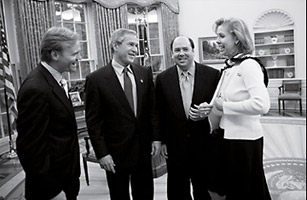
President Bush speaks with Dickerson, left, Cooper and Gibbs in the Oval Office
President George W. Bush sat down in the Oval Office with White House correspondents Matthew Cooper and John Dickerson and editor at large Nancy Gibbs to talk about Iraq, his second term and how he views his place in history.
TIME: You got a pretty big Christmas present a year ago today when they pulled Saddam Hussein out of that hole. So we thought we'd start with what you wanted for Christmas this year?
Bush: You know, I want there to be elections in Iraq on January the 30th, and for people to have a chance to express themselves. The Afghan elections were a really important part of a strategy that, on the one hand, defends ourselves with military action and, on the other hand, defends ourselves with the spread of freedom. And it is a great moment for the world to see a country that has gone from desperation and barbarism to one in which people actually showed up to vote to decide their presidency. Iraq will be enjoying the same opportunity — different circumstances, I readily concede. But I'm looking forward to those elections.
What kind of turnout are you looking for in the Iraqi elections? Fifty percent, seventy percent?
I would hope as many people as possible.
What does that feel like to have no more elections yourself?
Well, I haven't had much time to reflect on it. It turns out — as you know, I made the decision to change members of my Cabinet. I've had a lot going on, so I haven't been in a very reflective mood. I think over the Christmas holidays it'll all sink in.
I will tell you, though, that — first of all, it was a hard-fought campaign. Both of us worked really hard. I felt invigorated. There's something really refreshing about being endorsed by the people. It's hard to describe to you, unless you've actually been through it. But to stand up there and say — as you know, endlessly — exactly what I intend to do and over and over and over and over again, and then to have the people say, "We hear you and we're for you" is a — it's an energizing moment. So I feel energized about it all. In terms of not running again, you know, I've always felt politics would be just a chapter of my life, not my life. And so I don't have any remorse about saying, oh, gosh, no more campaigns. I say that now — maybe 10 years from now, when you find me somewhere, I'll be longing for a campaign. I doubt it. [Laughter.]
TIME: Sheriff ...
Yes, exactly. Some say I've already got it. [Laughter]
How was your re-election campaign different from those waged by Bill Clinton and Ronald Reagan?
Mine was different because the circumstances were different. I mean, I had to make it very clear that the foreign policy of this administration would lead to peace. This was a tough four years for the American people; I know it has been. And I think it's very important for somebody running for office to say that, one, I will confront problems and not pass them on but also that by having confronted problems, that the next four years will be hopefully a more peaceful period of time for people.
Another thing that you did is that you told people what they might not want to hear. "You may not agree with me, but you know where I stand."
Well, I guess that's called stubborn. Wasn't that the word they used at some point in time, is stubborn? Look, I believe that if you believe something you've got to stand your ground, particularly in the face of criticism. I think the American people are looking at somebody running for office and they want to know what they believe, why they believe it, and do they really believe it. And it's particularly important in these kinds of unsettling times. Take, for example, my Christmas wish for the elections. I believe they ought to be on January the 30th, and I've said so, point-blank. I mean, everybody — it's clear to everybody, whether it be here in America or in Iraq, in the councils of government, what my position is. And it is essential that it be clear and understandable. Otherwise, if it were vague — "Well, we'll see what it looks like at the time" — you can bet people will find a reason not to do the hard work. And when it comes to a campaign, you know, you have to live with yourself when it's all said and done. Plus, I believe strongly when I say something, I generally believe it. Not generally believe it, I believe it. I always believe it. Scratch the generally.